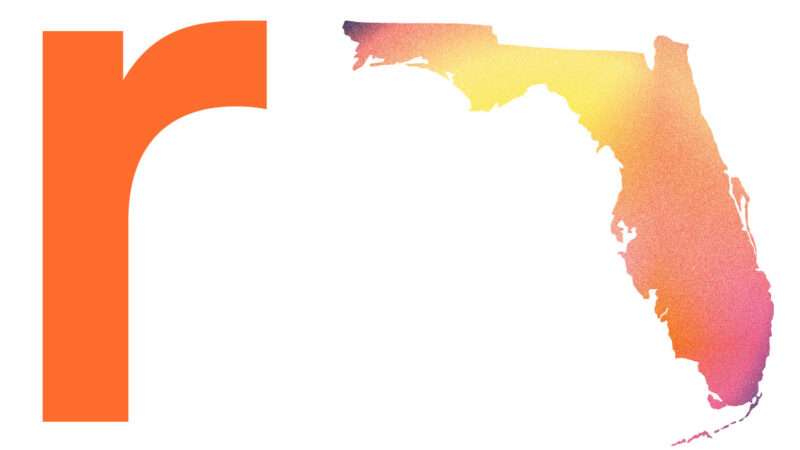
Florida is a land of attainable possibilities. It's sunny, it's warm, there's a magic castle anyone can visit, there's no income tax, and there's enough beach for everyone. It lacks the pristine glamour of California or Hawaii, but it's cheaper and more accessible in nearly every sense. What it lacks in polish, it makes up for in unpredictability. It's a paved paradise—with plenty of parking lots.
As a child, I was shipped off to Jacksonville for a couple of weeks every summer to enjoy the kind of oversugared, under-structured time that happens when you're left in the care of out-of-practice grandparents. I'd stretch out on a patch of pinky-beige carpeting under the skylight in their house reading age-inappropriate Stephen King novels and waiting for the afternoon deluge, then head outside to watch the sun force steam up from the wet pavement. Sometimes we'd drive to see the Weeki Wachee mermaids.
Those grandparents moved to Florida in 1970 for economic opportunity and a fresh start, and they got what they came for. By the time I knew him, my grandfather's American Dream consisted of playing Nintendo golf in a La-Z-Boy while gazing out the window at an actual golf course. They rarely went to the beach, but they liked the idea that they could.
During the COVID-19 pandemic, more than 2 million people made the same pilgrimage, for much the same reasons. They fled the roped-off playgrounds of New York City, the shuttered schools of California, the cramped and chilly apartments of Chicago, and the masked streets of New Jersey. They didn't necessarily want to go to the beach either, but they desperately wanted to know that they could.
Florida Gov. Ron DeSantis—who remains in the race for the GOP presidential nomination at press time, albeit with declining prospects—can rightly boast about the attractions his state offered at a terrible moment in history, and take real credit for resisting what turned out to be largely ineffective closures and mandates. But most of what is magical about Florida existed long before DeSantis pulled on his boots. The siren song of the Sunshine State is the promise of freedom tinged with the idea of escape—most perfectly channeled by the late Jimmy Buffett.
Florida was not, and is not, a libertarian utopia, though the lack of income tax is pretty nice. DeSantis has chosen to focus his campaign on his more authoritarian culture war forays, including his punitive approach to Disney's corporate political speech, his administration's meddling in school libraries and curriculum, and his harsh treatment of immigrants.
As Floridians never tire of pointing out, there are many different cultures contained within the state. In this special Florida issue of Reason, we explore some of the state's experiments in living. From Zora Neale Hurston's black hometown of Eatonville to the infamous senior-centered community of The Villages to the nearly ungovernable Keys, Floridians love to carve out a little spot to try something new.
"We're the only state with mermaids on the state government payroll," Florida newsman Craig Pittman told Reason's C.J. Ciaramella—a Florida Man himself—for one story. "The state employs python hunters. We're the only state where we actually made a hippo an official citizen of the state so he could stay. That's just not something you see anywhere else."
I came of political age in 2000, the era when Florida was the butt of an extremely unfunny national joke about hanging chads, those tiny pieces of punched-out paper dangling off a few Floridian ballots. Those little punchouts ended up deciding which president would deal with 9/11. In an astonishing tale of redemption, Florida has learned from its mistakes and now ranks among the nation's speediest and most competent vote counters.
In 2020, Reason proposed that columnist and funnyman Dave Barry run for office on the slogan "Florida Man for President." In 2024, we're back for another election-year look at the Sunshine State and a reconsideration of the origins and cultural power of the Florida Man.
Is there something about Florida, pre- and post-COVID, that attracts people of a certain temperament? Is there something in the water that transforms them once they are there? (Florida was once the rumored location of the Fountain of Youth.) Or is it simply the state's Sunshine Law that allows outsiders to witness humanity in all of its glory?
Even if DeSantis washes out (and Barry refuses to serve), there's a good chance a Florida Man will be on the ballot. Former President Donald Trump is in the end stages of his transformation from a New York Man to a Florida Man, with Mar-a-Lago serving as a place to keep his boxes.
Like my grandparents before him, COVID refugees after him, and immigrants forever, perhaps he migrated south for economic opportunity, a fresh start—and proximity to a golf course.
The post The Future Is Florida appeared first on Reason.com.







